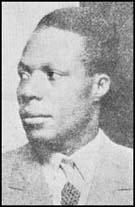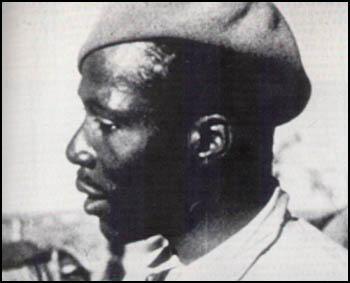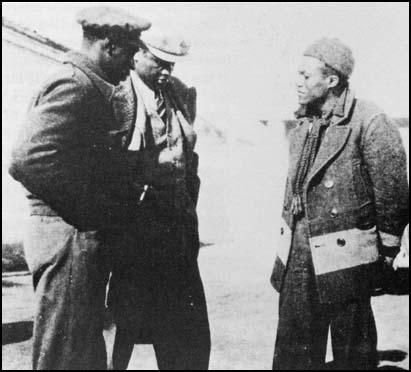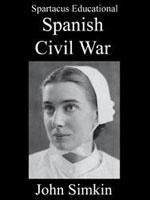Oliver Law

Oliver Law was born in Texas in 1899. He served in the United States Army during the First World War. After six years in the forces he left to work in a cement factory. He later moved to Chicago where he drove a taxi, worked as a stevedore and ran a small restaurant.
During the Great Depression Law joined the American Communist Party and became active in the unemployment movement. This included the organization of the International Unemployment Day demonstration on 6th March 1930. During the demonstration Law, Joe Dallet, Steve Nelson and eleven other activists were arrested and badly beaten by the police. Two weeks after the beatings Law had recovered sufficiently to march with 75,000 demonstrators to demand unemployment insurance. Law also helped to organize mass protests against Benito Mussolini and the Italian invasion of Ethiopia.
In 1936 Law joined the Abraham Lincoln Battalion, a unit that volunteered to fight for the Popular Front government during the Spanish Civil War. Law arrived in Spain in January 1937 and joined the other International Brigades at Albacete.
After failing to take Madrid by frontal assault General Francisco Franco gave orders for the road that linked the city to the rest of Republican Spain to be cut. A Nationalist force of 40,000 men, including men from the Army of Africa, crossed the Jarama River on 11th February, 1937.

General José Miaja sent three International Brigades to the Jarama Valley to block the advance. Law first saw action on 27th February. He performed so well in the battle he was promoted to commander of the machine-gun company. A few weeks later he became battalion commander. It was the first time in American history that an integrated military force was led by an African-American officer.
On 6th July 1937, the Popular Front government launched a major offensive in an attempt to relieve the threat to Madrid. General Vicente Rojo sent the Republican Army to Brunete, challenging Nationalist control of the western approaches to the capital. The 80,000 Republican soldiers made good early progress but they were brought to a halt when General Francisco Franco brought up his reserves.

Fighting in hot summer weather, the Internationals suffered heavy losses. Oliver Law was killed on 9th July when he was leading his men in an attack against Mosquito Ridge.
After the war, an anti-Communist, William Herrick, claimed that Law had been murdered by his own men who objected to being led by a black man. This claim has been dismissed by Harry Fisher, the battalion runner, who took part in the offensive: "He was the first man over the top. He was in the furthest position when he was hit by a fascist bullet in the chest." David Smith, the medic who attempted to staunch the bleeding with a coagulant, also confirmed that he had been killed by the Nationalists.
Paul Robeson attempted to get a film made on the life of Law. Robeson later complained "the same money interests that block every effort to help Spain, control the Motion Picture industry, and so refuse to allow such a story."
Primary Sources
(1) Oliver Law, interviewed by a reporter after the offensive at Jarama River (February, 1937)
We came to wipe out the fascists. Some of us must die doing that job. But we'll do it here in Spain, maybe stopping fascism in the United States, too, without a great battle there.
(2) Steve Nelson explained why Oliver Law was promoted to company commander when he was interviewed by Peter N. Carroll on 9th June 1990.
The idea was that we do something about advancing a black. But the thing that mattered most was that he had military experience. Law was the guy who had the most experience and was the most acquainted with military procedures on the staff.
(3) Canute Frankson, member of the Abraham Lincoln Battalion, letter from Albacete (6th July, 1937)
I'm sure that by this time you are still waiting for a detailed explanation of what has this international struggle to do with my being here. Since this is a war between whites who for centuries have held us in slavery, and have heaped every kind of insult and abuse upon us, segregated and Jim-crowed us; why I, a Negro who have fought through these years for the rights of my people, am here in Spain today?
Because we are no longer an isolated minority group fighting hopelessly against an immense giant. Because, my dear, we have joined with, and become an active part of, a great progressive force, on whose shoulders rests the responsibility of saving human civilization from the planned destruction of a small group of degenerates gone mad in their lust for power. Because if we crush Fascism here we'll save our people in America, and in other parts of the world from the vicious persecution, wholesale imprisonment, and slaughter which the Jewish people suffered and are suffering under Hitler's Fascist heels.
All we have to do is to think of the lynching of our people. We can but look back at the pages of American history stained with the blood of Negroes; stink with the burning bodies of our people hanging from trees; bitter with the groans of our tortured loved ones from whose living bodies ears, fingers, toes have been cut for souvenirs - living bodies into which red-hot pokers have been thrust. All because of a hate created in the minds of men and women by their masters who keep us all under their heels while they suck our blood, while they live in their bed of ease by exploiting us.
(4) Eslanda Goode diary entries while in Spain visiting the International Brigades in January 1938.
Monday 31st January: We had a good talk over lunch and afterwards over coffee in the lounge, and then we went off to the border. Fernando, in civilian dress, accompanied us, and Lt. K., armed in full uniform, was our official escort.
As we drove along, Lt. K. got talking and told us the story of Oliver Law. It seems he was a Negro - about 33 - who was a former army man from Chicago. He had risen to be a corporal in the US Army. Quiet, dark brown, dignified, strongly built. All the men liked him. He began here as a corporal, soon rose to sergeant, lieutenant, captain and finally was commander of the Battalion - the Lincoln-Washington Battalion. Lt. K. said warmly that many officers and men here in Spain considered him the best battalion commander in Spain. The men all liked him, trusted him, respected him and served him with confidence and willingly.
Lt. K. tells of an incident when the battalion was visited by an old Colonel, Southern, of the US Army. He said to Law - 'Er, I see you are in a Captain's uniform?' Law replied with dignity, 'Yes, I am, because I am a Captain. In America, in your army, I could only rise as high as corporal, but here people feel differently about race and I can rise according to my worth, not according to my color!' Whereupon the Colonel hemmed and hawed and finally came out with: 'I'm sure your people must be proud of you, my boy.' 'Yes,' said Law. 'I'm sure they are!'
Lt. K. says that Law rose from rank to rank on sheer merit. He kept up the morale of his men. He always had a big smile when they won their objectives and an encouraging smile when they lost. He never said very much.
Law led his men in charge after charge at Brunete, and was finally wounded seriously by a sniper. Lt. K. brought him in from the field and loaded him onto a stretcher when he found how seriously wounded he was. Lt. K. and another soldier were carrying him up the hill to the first aid camp.
On the way up the hill another sniper shot Law, on the stretcher; the sniper's bullet landed in his groin and he began to lose blood rapidly. They did what they could to stop the blood, hurriedly putting down the stretcher. But in a few minutes the loss of blood was so great that Law died.


